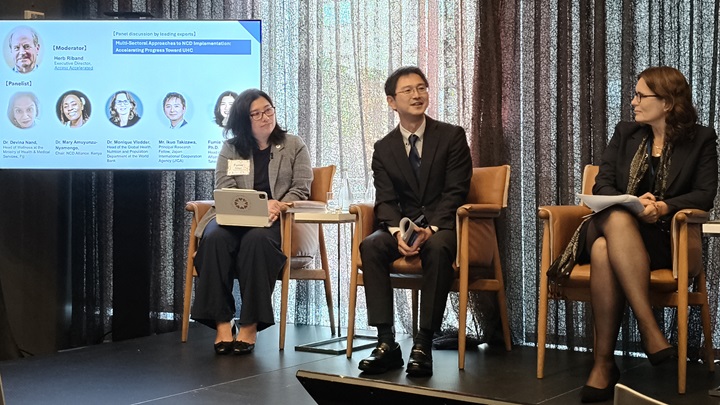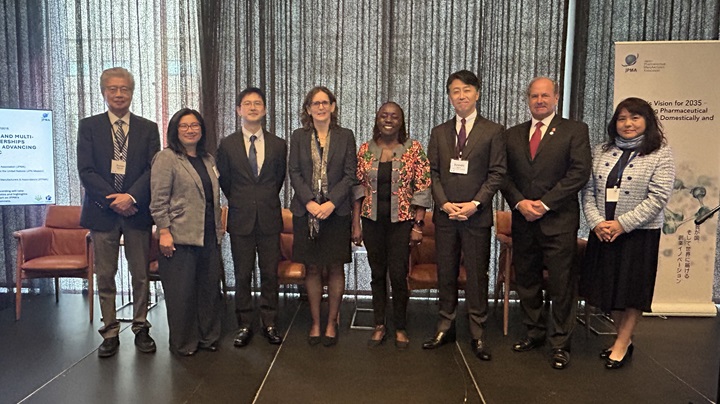Japan’s Role in the Global Response to Noncommunicable Diseases: Presented at a Side Event of the 80th UN General Assembly in 2025
2025.11.12
On Sep. 24, 2025, Takizawa Ikuo , Principal Research Fellow at the JICA Ogata Sadako Research Institute for Peace and Development (JICA Ogata Research Institute) participated in a side event during the 80th session of the United Nations General Assembly in New York.
The event, titled “Japan’s Innovation and Multi-Stakeholder Partnerships for Tackling NCDs: Advancing the Pathway to UHC” was hosted by the Japan Pharmaceutical Manufacturers Association (JPMA) and co-sponsored by the Permanent Mission of Japan to the United Nations, with support from the International Federation of Pharmaceutical Manufacturers and Associations. Satoshi Ezoe, Senior Assistant Minister for Global Health, Ministry of Health, Labour and Welfare of Japan, delivered the opening remarks, while the closing remarks were provided by Manabe Sunao, Vice President of JPMA.
In his keynote address, Takizawa highlighted Japan’s contributions to addressing the global challenge of noncommunicable diseases (NCDs) through universal health coverage (UHC) and broader capacity-building efforts. He emphasized that Japan’s experience dealing with NCD challenges of its own offers valuable insights for global health policy and practice.

Takizawa Ikuo, Principal Research Fellow at the JICA Ogata Research Institute (center), discusses global challenges posed by noncommunicable diseases.
To illustrate Japan’s achievements, Takizawa referred to a recent large-scale global comparative study which revealed that Japan has the lowest risk of premature death from major NCDs—namely cancer, cardiovascular disease, chronic respiratory disease, and diabetes—in the 30 to 70 age group among the 185 countries studied. He also referred to another study which concluded that during the COVID-19 pandemic, Japan experienced the smallest increase in excess deaths among the 30 most populous countries. These outcomes, he said, not only reflect Japan’s effective and resilient health system based on UHC but also factors associated with the people’s lifestyle, health-seeking behavior, etc., and the favorable environment (social, economic and cultural, etc.). He stressed that there were reasons for Japan to promote both UHC and pandemic prevention, preparedness and responses (PPR) as outlined in its Global Health Strategy (2022) and reaffirmed in the G7 Hiroshima Leaders’ Communique (2023), because UHC and PPR go together.
Building on this foundation, Takizawa reiterated JICA’s approach to addressing NCDs in three perspectives, as programs based on UHC vision, planetary health vision, and human security vision. He provided examples of programs based on the UHC vision such as the Centers of Excellence approach (Bolivia), Primary health care approach (Nicaragua, Honduras, and the Dominican Republic), Health Systems approach (Cambodia) and the Engagement approach (Fiji). Common features of these programs are the capacity development of partner countries to sustainably generate impact and working in partnership with both international and local partners and stakeholders.
Takizawa stressed that effectively addressing NCDs requires a comprehensive and integrated approach that works beyond health systems strengthening. In addition to UHC, he underscored the importance of embracing the visions of planetary health and human security. To exemplify the planetary health concept—which highlights the interdependence between human health and the health of the Earth’s ecosystems—he referred to JICA’s operations based on the concept of shokuiku (food and nutrition education), which addresses the “global syndemic” of obesity, undernutrition, and climate change. Examples provided were JICA’s support of school meal programs in Mongolia, Malaysia and Indonesia. He emphasized that JICA’s efforts to address global NCD challenge follow the principle of Human Security, placing people at the center and empowering them to act with agency, while providing protection and fostering solidarity across society and national borders.
Takizawa concluded by emphasizing the importance of Japan’s visionary yet practical leadership in global health, which turns ideas into action through capacity development and multi-stakeholder partnerships.

Takizawa (third from left) joins fellow presenters for a group photo.
To learn more about our research projects on noncommunicable diseases and our efforts in promoting human security, please visit the following links:

事業事前評価表(地球規模課題対応国際科学技術協力(SATREPS)).国際協力機構 地球環境部 . 防災第一チーム. 1.案件名.国 名: フィリピン共和国.

事業事前評価表(地球規模課題対応国際科学技術協力(SATREPS)).国際協力機構 地球環境部 . 防災第一チーム. 1.案件名.国 名: フィリピン共和国.

事業事前評価表(地球規模課題対応国際科学技術協力(SATREPS)).国際協力機構 地球環境部 . 防災第一チーム. 1.案件名.国 名: フィリピン共和国.

事業事前評価表(地球規模課題対応国際科学技術協力(SATREPS)).国際協力機構 地球環境部 . 防災第一チーム. 1.案件名.国 名: フィリピン共和国.

事業事前評価表(地球規模課題対応国際科学技術協力(SATREPS)).国際協力機構 地球環境部 . 防災第一チーム. 1.案件名.国 名: フィリピン共和国.
scroll